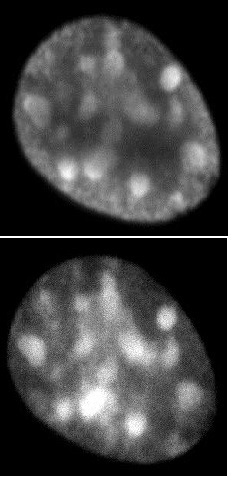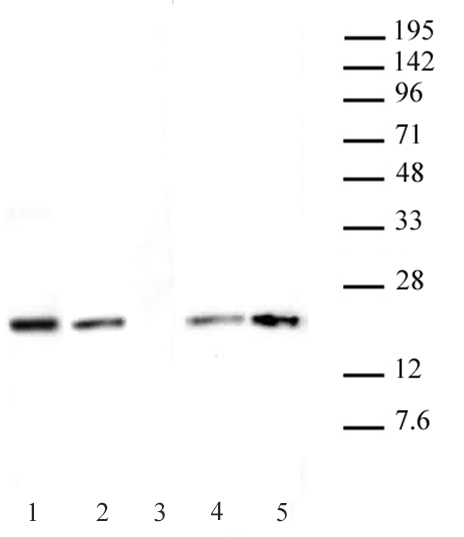Histone H3.1 / 3.2 antibody (mAb) (Clone 1D4F2)
Host / Isotype
Mouse / IgG2b
Reactivity
Human, Wide Range Predicted
Applications
ChIP, ChIP-Seq, ICC, IF, WB
CloneNo.
1D4F2
Cat No : 61629,61630 61629
Synonyms
Validation Data Gallery
Product Information
| Tested Applications |
ChIP, ChIP-Seq, ICC, IF, WB
Applications Validated by Active Motif: ICC/IF: 0.4 - 2 ug/ml dilution WB*: 0.2 - 2 ug/ml dilution *Note: many chromatin-bound proteins are not soluble in a low salt nuclear extract and fractionate to the pellet. Therefore, we recommend a High Salt / Sonication Protocol when preparing nuclear extracts for Western Blot. |
| Tested Reactivity | Human, Wide Range Predicted |
| Host / Isotype | Mouse / IgG2b |
| Class | Monoclonal |
| Type | Antibody |
| Immunogen | This antibody was raised against a peptide comprising amino acids 21-39 of human Histone H3.1. This region is 100% identical in human Histone H3.2. |
| Full Name | Histone H3.1 / 3.2 antibody (mAb) (Clone 1D4F2) |
| Synonyms | Histone H3.1 / 3.2, 3.1, 3.2, Histone H3, globular domain, nucleosome, chromatin, antibody, antibodies, monoclonal, histone H3, histone, H3, histone-H3, histoneH3, mAb, antibody, antibodies, chip, chromatin immunoprecipitation, chip-seq, immunofluorescence, if, immunocytochemistry, icc, western blotting, wb, sample, h3variant |
| Molecular weight | 17 kDa |
| GenBank accession number | NP_003522 |
| RRID | AB_2793710 |
| Purification Method | Protein A Chromatography |
| Buffer | Purified IgG in PBS with 30% glycerol and 0.035% sodium azide. Sodium azide is highly toxic. |
| Storage | Some products may be shipped at room temperature. This will not affect their stability or performance. Avoid repeated freeze/thaw cycles by aliquoting items into single-use fractions for storage at -20°C for up to 2 years. Keep all reagents on ice when not in storage. |
Background Information
Histone H3 is one of the core components of the nucleosome. The nucleosome is the smallest subunit of chromatin and consists of 147 base pairs of DNA wrapped around an octamer of core histone proteins (two each of Histone H2A, Histone H2B, Histone H3 and Histone H4). Histone H1 is a linker histone, present at the interface between the nucleosome core and DNA entry/exit points. Histone H1 is responsible for establishing higher-order chromatin structure. Chromatin is subject to a variety of chemical modifications, including post-translational modifications of the histone proteins and the methylation of cytosine residues in the DNA. Reported histone modifications include acetylation, methylation, phosphorylation, ubiquitylation, glycosylation, ADP-ribosylation, carbonylation and SUMOylation; these modifications play a major role in regulating gene expression. There are three protein variants of Histone H3, Histone H3.1, 3.2 and 3.3. The incorporation of Histone H3.1 and H3.2 into nucleosomes is replication dependent, in contrast to Histone H3.3, which is independent of DNA synthesis and occurs throughout the cell cycle. Human Histone H3.1 and H3.2 are identical in amino acid sequences except at position 110 where H3.1 has a cysteine and H3.2 has a serine.


